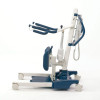Invacare ROZE Owners Manual - Page 14
Lifting the Patient, Positioning the Stand Up Lift - stand up lift parts
 |
View all Invacare ROZE manuals
Add to My Manuals
Save this manual to your list of manuals |
Page 14 highlights
SECTION 4-LIFTING THE PATIENT SECTION 4-LIFTING THE PATIENT ƽ WARNING DO NOT exceed the maximum weight limitation of 450 lbs. DO NOT attempt to any transfer without approval of the patient's physician, nurse or medical assistant. ALWAYS keep hands and fingers clear of moving parts to avoid injury. Invacare patient slings are made specifically for use with Invacare patient lifts. For the safety of the patient, DO NOT intermix patient slings and patient lifts of different manufacturers. Individuals that use the standing patient sling MUST be able to support the majority of their own weight, otherwise injury may occur. Before lifting the patient, make sure the bottom edge of the standing patient sling is positioned on the lower back of the patient and the patient's arms are outside the standing patient sling. The belt MUST be snug, but comfortable on the patient, otherwise the patient can slide out of the patient sling during transfer possibly causing injury. After EACH laundering (in accordance with laundering instructions on the patient sling), inspect the patient sling for wear, tears and loose stitching. Discard any patient sling that meets these criteria IMMEDIATELY. Bleached, torn, cut, frayed or broken slings are unsafe and their use could result in injury or damage. Discard any patient sling that meets these criteria IMMEDIATELY. DO NOT alter patient slings. DO NOT move the patient if the patient sling is not properly connected to the attachment points on the patient lift. Check that the patient sling is properly connected to the attachment points BEFORE lifting the patient. During transfer, with the patient suspended in the patient sling, DO NOT roll the base of the patient lift over any uneven surfaces that would cause the patient lift to become unstable. Use the steering handle on the mast assembly at all times to push or pull the stand up lift. NOTE: Refer to the patient sling Owner's Manual, P/N 102891, for more information. Positioning the Stand Up Lift NOTE: For this procedure, refer to FIGURE 4.1 on page 15. NOTE: Refer to General Guidelines on page 8 before proceeding and observe all warnings indicated. NOTE: Before positioning the legs of the patient lift under a bed, make sure that the area is clear of any obstructions. ƽ WARNING The legs of the stand up lift MUST be in the maximum open position for optimum stability and safety. If it is necessary to close the legs to maneuver the stand up lift under a bed, close the legs only as long as it takes to position the stand up lift over the patient and lift the patient off the surface of the bed. When the legs of the stand up lift are no longer under the bed, return the legs to the maximum open position. 1. Press the legs open button on the hand control to open the legs of the stand up lift to the maximum open position. Roze™ Stand Up Patient Lift 14 Part No. 1150703















